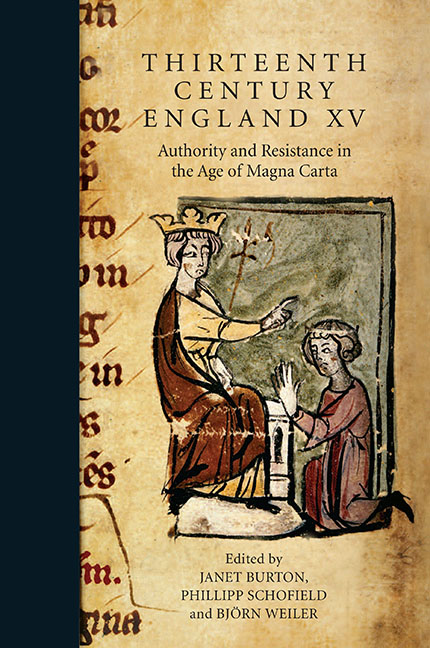 Thirteenth Century England XV
Thirteenth Century England XV How did Thirteenth-Century Knights counter Royal Authority?
Published online by Cambridge University Press: 11 June 2021
Summary
It is well understood that thirteenth-century knights had their own grievances against the crown, both personal and collective, and that collective grievances beyond baronial ranks surfaced in Magna Carta. Their contours are well known and there is little need to recite them now. What I want to concentrate on here are the mechanisms by which lesser landowners resisted, rebelled or become caught up in political programmes against the crown. At first sight these mechanisms might seem obvious. As historians have long stressed, there are two institutional dimensions to such resistance. By way of shorthand, I will call them ‘feudal’ and ‘public’. The former involved tenurial obligation and/or membership of a retinue or affinity, and it revolved around allegiance to a lord who had entered the political fray. This dimension has been thoroughly appreciated since the publication of J.C. Holt's The Northerners. Holt, to be sure, allowed for other ‘complex influences’, including the role of powerful sub-tenants and the contiguity of landholding, that is to say, the factor of neighbourhood. Others have stressed the importance of locality in terms of both identity and action. How precisely political action was generated by this factor, however, remains elusive. Moreover, it would be a long time before territorial affiliation transcended the retinue as a central component of aristocratic society. The conditions of the peace settlement following the Dictum of Kenilworth, reflected in the special eyres of 1268–70, encapsulated this when they exempted members of the retinues of Gilbert de Clare and John Giffard. Other men argued that they had been coerced or frightened into joining retinues during the disturbance (turbatio) in the realm. There can be no doubt that the retinue, as the institutionalised relationship between lord and men, could function as a collective and could exert pressure. Hugh Thomas has re-emphasized, rightly in my view, the role of the barons in gaining concessions for their followers in Magna Carta. It is in this context that we generally understand the revolt of ‘the community of the bachelors of England’ at Westminster in October 1259, when the retainers of the parliamentary magnates forced the pace of reform.
- Type
- Chapter
- Information
- Thirteenth Century England XVAuthority and Resistance in the Age of Magna Carta. Proceedings of the Aberystwyth and Lampeter Conference, 2013, pp. 3 - 16Publisher: Boydell & BrewerPrint publication year: 2015


